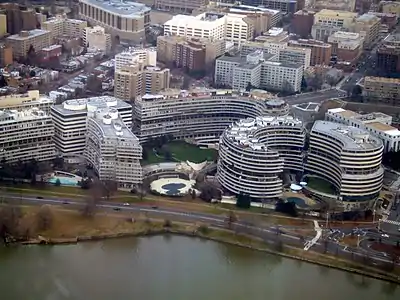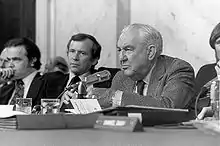United States Senate Watergate Committee
The Senate Watergate Committee, known officially as the Select Committee on Presidential Campaign Activities, was a special committee established by the United States Senate, S.Res. 60, in 1973, to investigate the Watergate scandal, with the power to investigate the break-in at the Democratic National Committee (DNC) headquarters at the Watergate office complex in Washington, D.C., and any subsequent cover-up of criminal activity, as well as "all other illegal, improper, or unethical conduct occurring during the controversial 1972 presidential election, including political espionage and campaign finance practices".
| Special committee | |
|---|---|
Defunct United States Senate 93rd Congress | |
| History | |
| Formed | February 7, 1973 |
| Disbanded | abolished after June 27, 1974, when the committee's final report was published |
| Leadership | |
| Chair | Sam Ervin (D) |
| Ranking member | Howard Baker (R) |
| Structure | |
| Seats | 7 members |
| Political parties | Majority (4)
|
| Jurisdiction | |
| Purpose | To investigate "illegal, improper, or unethical activities" conducted by individuals involved with a campaign, nomination, and/or election of any candidate for President of the United States in the 1972 presidential election, and produce a final report with the committee's findings. |
| Rules | |
| Watergate scandal |
|---|
 |
| Events |
| People |
American print news media focused the nation's attention on the issue with hard-hitting investigative reports, while television news outlets brought the drama of the hearings to the living rooms of millions of American households, broadcasting the proceedings live for two weeks in May 1973. The public television network PBS broadcast the hearings from gavel to gavel on more than 150 national affiliates.
Working under committee chairman Sam Ervin (D-North Carolina), the committee played a pivotal role in gathering evidence that would lead to the indictment of forty administration officials and the conviction of several of Richard Nixon's aides for obstruction of justice and other crimes. Its revelations later prompted the impeachment process against Nixon himself from October 1973 to August 1974, which featured the introduction of three articles of impeachment by the House Committee on the Judiciary. Watergate led to Nixon's resignation on August 9, 1974.
Background
Shortly after midnight on June 17, 1972, five men were arrested inside the DNC offices.[1] The FBI launched an investigation of the incident, and the dogged reporting of two Washington Post journalists, Bob Woodward and Carl Bernstein, raised questions and suggested connections between Richard Nixon's controversial reelection campaign and the men awaiting trial. The White House denied any connection to the break-in, and Nixon won reelection in a landslide.[2] Following confirmation that such a connection did in fact exist, the Senate voted 77–0 in February 1973 to create the Select Committee on Presidential Campaign Activities.[3]
Members
The members of the Senate Watergate Committee were:
|
| |||||||||||||||||||||||||||
The chief counsel of the Committee was Samuel Dash, who directed the investigation. The minority counsel was Fred Thompson. Members of the Senate Watergate Committee's professional staff included:
- Rufus Edmisten (Deputy Counsel)
- Donald Sanders (Deputy Minority Counsel – Republican)
- David M. Dorsen (Assistant Chief Counsel)
- James Hamilton (now of Morgan, Lewis & Bockius (Assistant Chief Counsel)
- Terry Lenzner[4] (Assistant Chief Counsel)
- Scott Armstrong
- Robert Muse
- Marc Lackritz
- Gordon L. Freedman
Hearings

Hearings opened on May 17, 1973, and the Committee issued its seven-volume, 1,250-page report on June 27, 1974, titled Report on Presidential Campaign Activities. The first weeks of the committee's hearings were a national politico-cultural event. They were broadcast live during the day on commercial television; at the start, CBS, NBC, and ABC covered them simultaneously, and then later on a rotation basis, while PBS replayed the hearings at night.[6] Some 319 hours were broadcast overall, and 85% of U.S. households watched some portion of them.[6] The audio feed also was broadcast, gavel-to-gavel, on scores of National Public Radio stations, making the hearings available to people in their cars and workplaces, and increased the profile of the fledgling broadcast organization.[7]
The hearings made stars out of both Ervin, who became known for his folksy manner and wisdom but resolute determination, and Baker, who appeared somewhat non-partisan and uttered the famous phrase "What did the President know, and when did he know it?" (often paraphrased by others in later scandals). It was the introduction to the public for minority counsel Thompson, who would later become an actor, senator, and presidential candidate.
Many of Watergate's most famous moments happened during the hearings. During former White House counsel John Dean's 4 days before the committee, he testified about the cover-up, who was involved including himself and events related to it (including him telling Nixon that March 21st that there was a "cancer on the Presidency") and confirmed to Inouye that the Nixon White House kept a list of its enemies – including Weicker, who then called for added transparency in the executive branch. Meanwhile, FAA chairman and former White House deputy assistant Alexander Butterfield revealed the existence of the secret Nixon White House tapes and Ervin sparred with former Nixon chief domestic policy advisor John Ehrlichman about whether constitutional law allowed a President to sanction such actions as the Watergate break-in and a break-in at the office of the psychiatrist to Daniel Ellsberg, the former assistant to the Assistant Secretary of Defense for International Security Affairs who had leaked the Pentagon Papers.[8]
References
- "Watergate Scandal, 1973 In Review". United Press International. September 8, 1973. Retrieved June 17, 2010.
- "Select Committee on Presidential Campaign Activities (The Watergate Committee)". Senate Historical Office. Retrieved December 31, 2016.
- "March 28, 1973: Watergate Leaks Lead to Open Hearings". Senate Historical Office. Retrieved December 31, 2016.
- The $100,000 Misunderstanding, Time, May 6, 1974
- Senate Select Committee Final Report of the Senate Select Committee on Presidential Campaign Activities, by Senate Select Committee on Presidential Campaign Activities, USA, 1974, pages III and VII. Retrieved June 4, 2018.
- Ronald Garay, "Watergate", Museum of Broadcast Communications. Accessed June 30, 2007.
- "'Gavel-to-Gavel': The Watergate Scandal and Public Television", American Archive of Public Broadcasting. Retrieved November 10, 2019.
- Summer of Judgment: The Watergate Hearings (Part 1 of 2) American Archive of Public Broadcast
External links
- Works by United States Senate Watergate Committee at LibriVox (public domain audiobooks)

- Coverage of the Watergate Hearings by the National Public Affairs Center for Television (NPACT) at the American Archive of Public Broadcasting